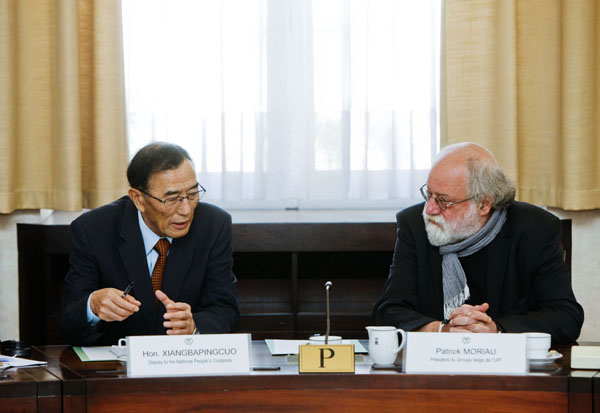Dalai Lama group urged to abandon separatism
Updated: 2012-05-16 07:51
By Fu Jing in Brussels (China Daily)
|
||||||||
The Chinese government will not involve the Dalai Lama group in talks if it continues to promote separatism and incite monks and young Tibetans to carry out self-immolations, a visiting leader of China's Tibet autonomous region said on Tuesday in Brussels.
Even if conditions allow the Chinese government to engage the Dalai Lama group, the "only topic" on the agenda should be the "personal future of the Dalai's followers and Tibetans overseas", said Qiangba Puncog, head of the standing committee of the Tibet autonomous region's people's congress.
 |
|
Qiangba Puncog, head of the standing committee of the Tibet autonomous region's people's congress, talks with Patrick Moriau, member of the house of representatives of Belgium, in Brussels, on Tuesday. Zhou Lei / Xinhua |
"This is our principle of holding talks with the Dalai Lama's representatives," Qiangba said, sending a strong message at the seminar organized by the Brussels Institute of Contemporary Chinese Studies. Qiangba is leading a delegation to introduce the development of Tibet in Belgium and the European headquarters.
But the Dalai Lama's representatives are sticking to the points of separating Tibet from China and forming a "bigger Tibetan region", which includes parts of Qinghai, Sichuan and Yunnan, where other Tibetans live. "The union of a country and future of Tibet are not negotiable, and the only topic we want to talk is the personal future of Tibetans overseas," said Qiangba.
Self-immolations of monks and young Tibetans aroused much concern among Europeans at the seminar. Participants asked Qiangba to reveal the "true stories".
As a Tibetan, Qiangba said encouraging suicide is not a part of Tibetan Buddhism, and it is clear that the self-immolations are nothing but staged scenes directed by the Dalai Lama group, serving their separatist motive and agenda.
However, Qiangba clarified the misunderstanding that the self-immolations took place in Tibet. "So far there is not a single case of self-immolation in Tibet," said Qiangba, adding that Tibetans are also living in Qinghai, Sichuan and Yunan provinces.
Since last year, about 30 cases of self-immolations have happened in temples outside Tibet, and more than 20 monks and young Tibetans have died in the wrongdoings arranged by the Dalai Lama group. "I am very sad because of the self-immolations, and I am urging the Dalai Lama group to stop as soon as possible," said Qiangba.
Qiangba said all of the self-immolations took place at temples outside Tibet, and evidence showed that they were supported by the Dalai Lama group.
"Video materials clearly show who is setting the fires, who is taking photos and who is spreading such photos outside China to institutions such as the European Parliament," said Qiangba, who also gave videos to European researchers as references for research.
"And even though there is no such case in Tibet, Dalai Lama followers and some foreigners play up the issue and say 'Tibet is on fire'."
Qiangba said it is important for Europeans to remove their misunderstandings, biases and wrong ideas about Tibet, which is open to tourists, journalists and scholars.
Regarding China's firm stances on engagement with the Dalai group, Jonathan Holslag of the Brussels Institute of Contemporary Chinese Studies said: "I think every country has the right to decide the way to deal with its domestic issues. We Europeans should not be in the positions to lecture."
Holslag said it is very useful to have this kind of candid talk with Tibetan leaders and Western scholars. He said his institute will continue to play a bigger role to bridge the understanding gap between China and Europe, especially on sensitive topics such as Tibet.
fujing@chinadaily.com.cn

 Relief reaches isolated village
Relief reaches isolated village
 Rainfall poses new threats to quake-hit region
Rainfall poses new threats to quake-hit region
 Funerals begin for Boston bombing victims
Funerals begin for Boston bombing victims
 Quake takeaway from China's Air Force
Quake takeaway from China's Air Force
 Obama celebrates young inventors at science fair
Obama celebrates young inventors at science fair
 Earth Day marked around the world
Earth Day marked around the world
 Volunteer team helping students find sense of normalcy
Volunteer team helping students find sense of normalcy
 Ethnic groups quick to join rescue efforts
Ethnic groups quick to join rescue efforts
Most Viewed
Editor's Picks

|

|

|

|

|

|
Today's Top News
Health new priority for quake zone
Xi meets US top military officer
Japan's boats driven out of Diaoyu
China mulls online shopping legislation
Bird flu death toll rises to 22
Putin appoints new ambassador to China
Japanese ships blocked from Diaoyu Islands
Inspired by Guan, more Chinese pick up golf
US Weekly

|

|






